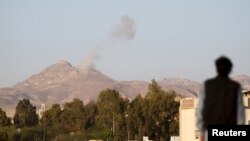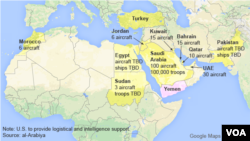A Saudi airstrike killed at least 45 people in a refugee camp in northern Yemen Monday.
Humanitarian workers say civilians are among the casualties.
Rebel-controlled state-run media say women and children were killed, but Saudi officials say they cannot confirm exactly what happened or who was hurt.
The airstrike was apparently targeting a nearby Houthi rebel military installation.
Saudi-led coalition ships have also imposed a blockade to try to stop the Houthis from seizing the main southern port of Aden.
Saudi Arabia is leading an Arab coalition with airstrikes to stop the advance of Shi'ite Houthi rebels in Yemen and assure President Abd-Rabbu Mansour Hadi can return to power.
Since last Thursday, a Saudi-led coalition has conducted an aerial bombardment throughout the country against Yemen's Houthi Shi'ite rebels, but Yemeni Foreign Minister Riyadh Yaseen blamed a Houthi artillery strike for the refugee camp casualties.
A spokesman for the International Organization for Migration said it was not immediately clear how many of those killed were civilians or armed personnel.
On Monday, largely Sunni Muslim Pakistan said it would send troops to Saudi Arabia, a regional ally, to join the coalition fighting Houthi rebels, according to a senior government official reported by Reuters.
However, a Pakistan government statement issued later Monday made no mention of troops but said Pakistan is committed to playing a meaningful role "in arresting the deteriorating situation in the Middle East."
Currently, 10 primarily Sunni-Arab states, including several Gulf states, Sudan, Egypt and Morocco, are taking part in the Saudi-led coalition in Yemen.
Fighting Monday
After seizing the Yemeni capital Sana'a last year, the Houthis have advanced toward the southern port city of Aden, the economic center of the impoverished nation.
The insurgents shelled Aden with artillery Monday as they pushed into the northeastern outskirts of the city, while Saudi fighter jets continued to pound rebel positions. Officials said the Houthis and supporters of former president Ali Abdullah Saleh battled local militias.
Meanwhile, India's Ministry of External Affairs (MEA) attempted to airlift nationals from Sana'a. Eighty Indians were flown out Sunday to Djibouti, on the opposite shore of the Gulf of Aden.
Akbaruddin said 400 Indians were being evacuated by sea from Aden and would reach Djibouti on Tuesday. They were to be flown home by the Indian Air Force.
The ministry said 4,000 Indian nationals live in Yemen.
The country's current president, Abd-Rabbu Mansour Hadi, had declared Aden the provisional capital before he fled the country for Riyadh last week.
About 100 people have been killed in the fighting in Aden in the last several days and Hadi's aides said he has no immediate plans to return there.
Arab leaders pledged Sunday to press their military campaign until the Iranian-backed Houthi rebels surrender. Hadi asked for help last week, saying the Houthis had rejected efforts for peace.
Saudi-led campaign
The Arab states would rather the U.S. or European governments take the lead in countering the conflict in Yemen, said Yoel Guzansky, an analyst with Tel Aviv's Institute for National Security Studies. But in the absence of a response by the world powers, they feel they must act to protect their interests, he said
"Yemen is important, not because of Yemen, but because it's another place where Arabs fight Persians, where Sunnis fight Shi'ites. It's another pawn on the chessboard of the Middle East," Guzansky said.
Analysts said the Arab states are increasingly worried about the conflicts in Syria, Iraq, Lebanon and Yemen where groups backed by Iran are gaining strength and where power vacuums are being exploited by Islamist militants.
Saudi Ambassador to Washington Adel al-Jubeir said the air campaign in Yemen is not a proxy war between Saudi Arabia and Iran.
Jubeir called the air campaign a "war of necessity" aimed at returning peace and stability in Saudi Arabia’s southern neighbor and protecting the Yemeni people against radicals with ties both to Iran and Hezbollah
"We had no choice. We tried every possible way to avoid it. The Yemenis tried every possible way to avoid it," he said.
Upheaval in Middle East
A specialist on Arab militaries at the same Institute, Yiftah Shapir, believes a major upheaval is underway in the Middle East.
"The Middle East is not going to be what it was. I don’t think anybody can say what it's going to be. We are still in the process. But it's going to be a very different region than the one it was," Shapir said.
Some analysts said the upheaval began four years ago with peaceful pro-democracy demonstrations and evolved into sectarian and ethnic-based conflicts will lead to a re-drawing of national borders set by colonial powers a century ago.
Guzansky said the borders are not changing in these countries but rather their internal political structures.
"We see a lot of failing states where the regime fell and I think Yemen probably represents the more acute, the more extreme model of that," he said.
But Guzansky said there are still strong governments around these failing states, such as Turkey, the Gulf Arab states and Israel, among others. And the perceived Iranian threat is drawing them together despite some deep differences.
"These same interests are converging and this is not new but it's intensifying between Israel and the Arabs. And there's a genuine paranoia here in Arab capitals," he said.
Analysts say the likelihood of a military victory in Yemen is slim and the Saudi-led airstrikes could draw an Iranian response in Yemen or through their allies elsewhere.
Michael O’Hanlon of the Brookings Institution in Washington told VOA senior Middle East reporter Mohamed Elshinnawi the Saudis will have to weigh the benefits of such an operation against the inevitable risks.
As a result, analysts say the best solution would be to bring the Yemeni rivals back to the negotiating table and broker some sort of power sharing agreement.
VOA's Ayaz Gul in Islamabad, senior Mideast correspondent Mohamed Elshinnawi and correspondent Scott Bobb in Jerusalem contributed to this report. Some material for this report came from Reuters.






